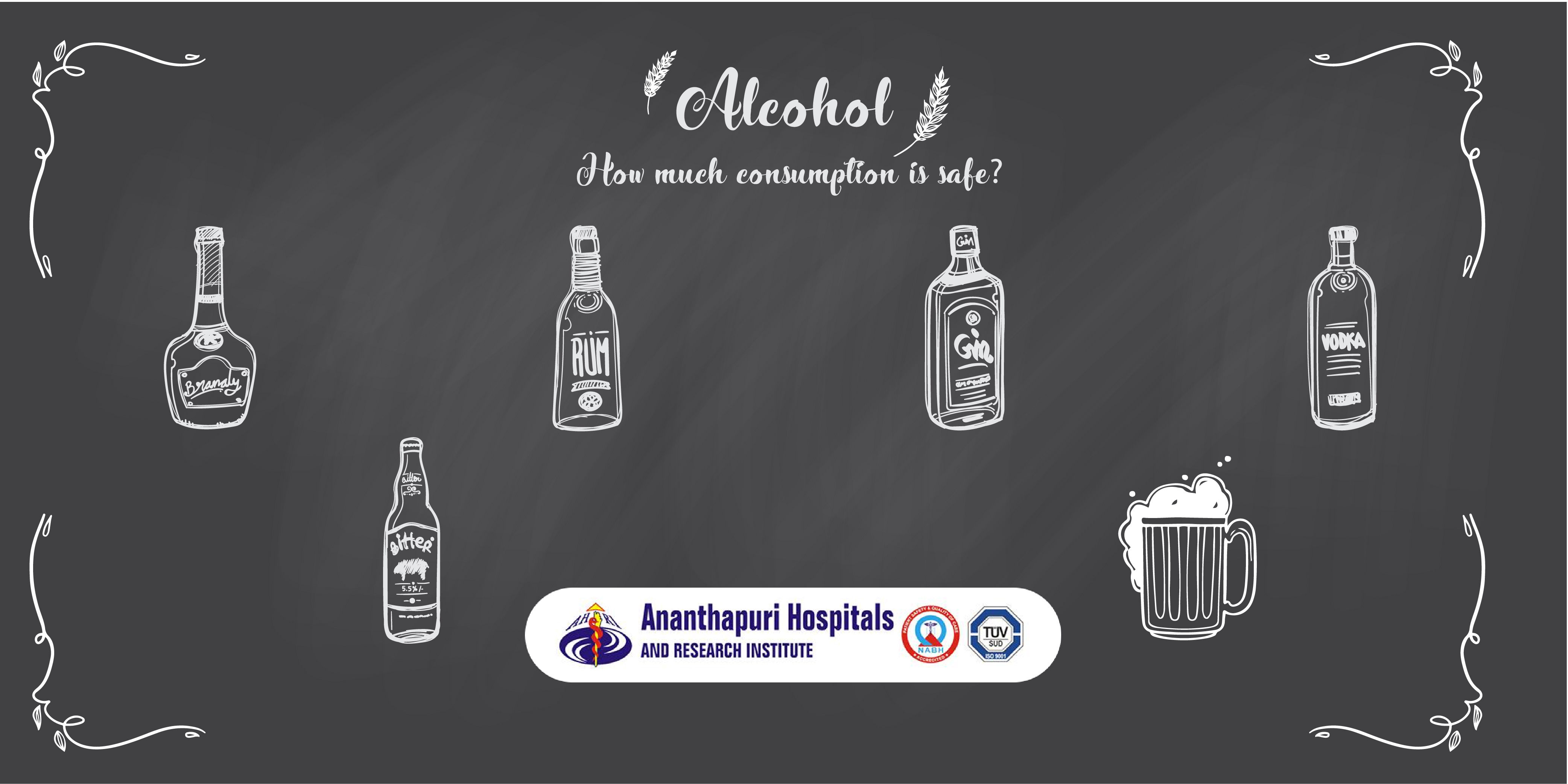- 19/December/2019

How much consumption of Alcohol is safe? - Ananthapuri Hospitals, Trivandrum
Alcohol is healthy.
Wine and whisky are good for the immune system and helps in preventing cancer.
Small amounts of alcohol cannot cause any harm and it helps you socialise.
You can drink and still be in control.
Too good to be true, right?
That’s because even though these facts sound interesting, these are just myths!
The hard truth is that even a small amount of alcohol can impair memory or cause brain damage. In addition, alcohol impairs sleep, which impacts cognitive and emotional function.
According to the World Health Organization’s (WHO) global status report, alcohol kills 2.6 lakh Indians every year either by causing liver cirrhosis, cancer or leading to road accidents caused by drunk driving.
The unfortunate fact is that the majority of the victims are children between the ages of 18 and 24 years.
What are the effects of alcohol consumption?
Excessive drinking can be toxic!
Alcohol has the potential to wreak havoc on the health of the body and cause many illnesses. The part of the brain that controls our balance, coordination and muscles, is slowed down by alcohol, and hence the activity is depleted.
Studies show that excess alcohol can lead to loss of vision, endanger the heart, cause dismemberment, and lead to other deadly diseases. Alcohol weakens the nerves and causes atherosclerosis (a disease which causes blockage inside your arteries), causing excessive fatigue. Alcohol can also cause psychological problems in humans.
The liver plays an important role in the metabolism of food, prevention of infection, control of blood flow, and removal of toxins, including alcohol. Long-term drinking can harm the liver in three steps.
- In the beginning, the breakdown of ethanol slows down the digestion of fat, which results in fat accumulating in the liver. This is commonly called fatty liver.
- The next stage is chronic liver disease or hepatitis. Besides being a direct cause of hepatitis, alcohol also can weaken the body's defence against hepatitis B and hepatitis C viruses. If left untreated, the cells can break apart and die. Alcohol has been shown to contribute to the destruction of both natural and genetic cells, making the situation worse
- Cirrhosis is the final stage. Continuous liver damage and cell death can cause irreparable harm. Gradually, the liver loses its softness and thickens. Eventually, the tissues, which have become too thick for the blood to flow, break down, leading to liver stagnation and death.
What is the recommended alcohol intake per day?
Moderation is crucial for health. But what exactly is a ‘moderate’ amount? Most people think they drink only moderately, thinking that there is nothing wrong unless they are out of their senses. But the fact is, one in four people drink alcohol in dangerous amounts.
Various studies suggest that 20gm of pure alcohol or two standard drinks per day for men and 10gm or one drink per day for women is a safe limit.
Measurement of one standard drink include:
- Beer: 355 ml
- Wine: 148 ml
- Distilled spirits (40% alcohol): 44 ml
In addition to that, The National Institute on Alcohol Abuse and Alcoholism, US recommends that people above the age of 65 should limit the number of drinks to only one per day.
For some, even these relatively low doses may cause harmful effects to their body. For those with depressive disorders and anxiety disorders, even moderate alcohol consumption may be harmful.
The fact is that there is no ‘safe’ amount of alcohol, it all depends on an individual, his age, medical history, body size and so on.
No amount of alcohol is good for you. Moderate drinking would mean you're just slowing down your deterioration. It is very important to know the harmful effects of alcohol before
consuming it.
If alcohol consumption is going out of control, or turning into an addiction - for you or your loved ones - feel free to call us on +91 9400332777 to book an appointment or visit our hospital in Thiruvananthapuram, Chaka, NH Bypass.
- tags

